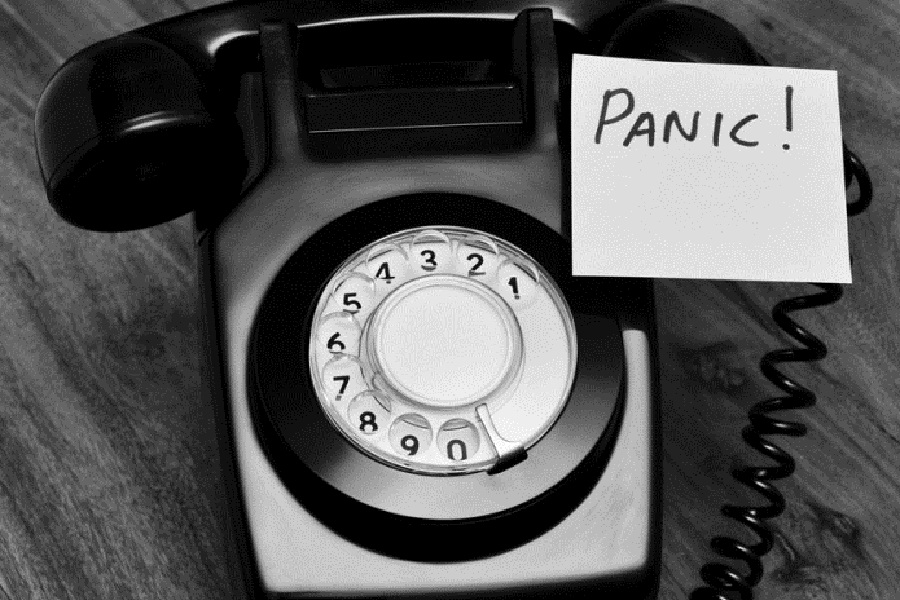
Published :
Updated :

Nafisa Islam MeghaHow many times have you stared at your ringing phone and felt your heartbeat spike like a ghost is chasing you? If that's you, don't worry. You're not being dramatic; you might just be dealing with telephonophobia, the fear or anxiety of making or receiving phone calls.
Yes, it's a thing. And you're not alone. Faysal Ahmed Rafi, Chief Psychologist at Mindwizz, says, "Telephonophobia is often rooted in social anxiety." He explains, "People who struggle to express themselves or maintain social relationships often experience this kind of anxiety. When the phone rings, they freeze. Symptoms like heart pounding, hands sweating, breath shortening begin to happen."
Please don't call, give me a text
In an era where texting, voice notes, and memes carry more weight than a full-blown conversation, phone calls have become a psychological battleground for many young people. Why say it when you can type it and edit it three times before hitting send?
"Almost always, even when I have to call someone I know, I get anxious," says Nuzhat Farhat Sadia, a postgraduate engineering student from BUET. "I can't even pinpoint the exact reason, but sometimes I worry the conversation will be too long or uncomfortable. With texts, I can leave it on 'seen' or ignore it. With calls, I can't escape," she adds.
But psychologist Mr Rafi warns that this shift in communication might be creating bigger problems. "Avoiding phone calls becomes a coping mechanism. Yet when we ignore necessary conversations like talking to a friend, a colleague, or a client over the phone when needed, it creates misunderstandings, harms relationships, and can even affect careers."
"What if I say something stupid?"
Fariha Eva, a bachelor's student from BRAC University, compares phone calls to stressful surprise presentations. "My mobile vocabulary is minimal," she says. "I can express myself so freely through text, but on a call, it feels impossible."
She adds, "Even if I prepare as I do for class presentations, I still get nervous. Also, being an introvert doesn't help."
Clinical psychologist Devbrota Majumder digs deeper into the psychological roots behind this phenomenon. "Social anxiety, past bad experiences, fear of being misunderstood, perfectionism, fear of uncertainty or rejection- all these can fuel phone phobia," he says.
So, can you fix it?
Sure, it's 2025, and most of us are living in a frenzy of DMs, chats, and snaps. But phone calls aren't going away anytime soon. And sometimes, they are the only way to connect. So, how can you overcome telephonophobia? Both psychologists agree on a few helpful approaches:
Understand your fear
The first step isn't to fight the fear but to understand it. "We have to try to understand how intense our telephone anxiety is, how long it has been going on, and which aspects of our daily life are being affected by it," says Mr Rafi.
Learn to calm yourself
Learning a few strategies to bring the mind to calmness may come in handy when picking up a phone. "Try to calm yourself using breathing exercises, progressive muscle relaxation, or grounding methods. Practice these before you make or receive a call," advises Mr Rafi.
Categorise your calls
Not every call deserves equal energy. Mr Rafi recommends mentally sorting your calls into four types: Urgent (must be made immediately), Important (can be scheduled), Routine (regular, but not essential), Unnecessary (can be skipped or shifted to text)
"This helps manage your energy and reduces the overwhelming feeling that every call needs your immediate attention," He adds.
Prepare before you dial
The fear of not knowing what to say can be overwhelming. When calling someone from the urgent or essential category, mentally revising or writing down some key points may help reduce anxiety.
"You can write down small keywords if needed, organise your thoughts beforehand, and speak slowly," Mr Rafi explains.
Communication is a two-way street; one needs to focus on the other person as well, which can also help prevent overly focusing on one's flaws. "Practice listening and understanding attentively without interrupting the other person," he adds.
Challenge and face what you've been avoiding
Mr Majumder highlights the idea of 'cognitive restructuring'. One needs to identify irrational thoughts like, 'I'll sound stupid' or 'They'll think I'm awkward.' Then ask, 'Is that true? What's the evidence?'.
Replacing those judgments with rational thoughts: 'With more and more practice, I will learn to handle phone calls effectively.'
Avoidance is comforting but temporary. Majumder emphasises 'exposure', where one needs to face the very situations they fear gently. Starting small, by making short calls to familiar people regularly, can help build confidence and skills gradually.
Know when to seek help
If the fear persists even after all the efforts, one might need professional support. "Sometimes past trauma, personality traits, or environmental stressors make it hard to overcome phobias alone," says Mr Rafi,
"A trained psychologist can help you create personalised strategies and guide you toward long-term relief."
nfsmegha@gmail.com


 For all latest news, follow The Financial Express Google News channel.
For all latest news, follow The Financial Express Google News channel.